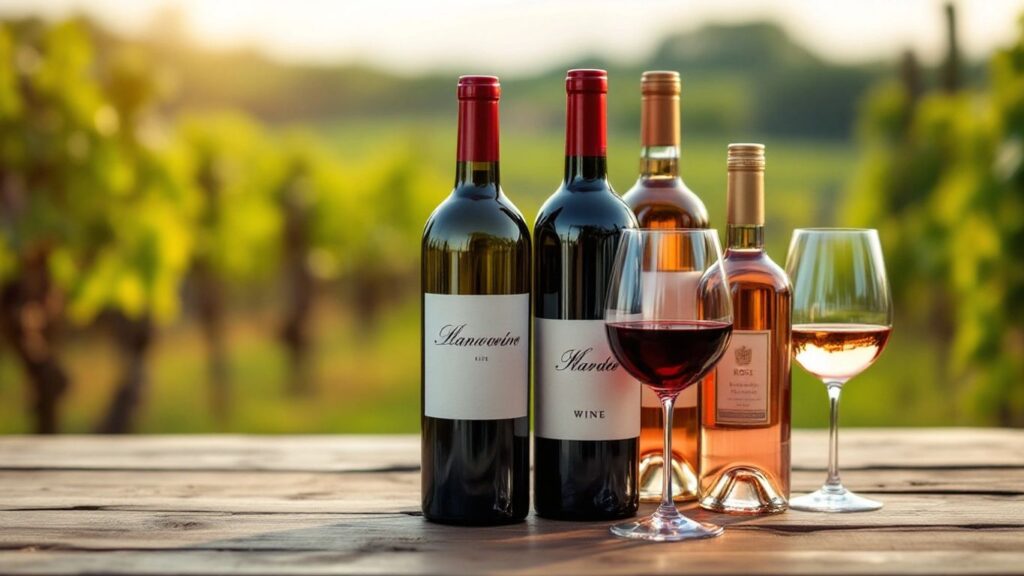Boutique wineries are changing the wine world. These small producers make unique wines with care and passion. They bring fresh ideas to an old industry.

You can find great wines from these new wineries. Boutique wineries offer you a chance to try special wines you won’t find anywhere else. They often use new methods to make wine. This leads to exciting tastes and styles.
1) Grgich Hills Estate
Grgich Hills Estate stands out as a pioneer in Napa Valley winemaking. You’ll find this iconic winery at the forefront of sustainable practices in the industry.
The estate boasts 100% certified regenerative organic vineyards. This commitment to natural minimal-intervention winegrowing sets them apart from many other producers.
When you visit Grgich Hills, you’ll experience a rich history. The winery played a key role in putting California wines on the global map. Their chardonnay famously won a blind tasting against French wines in 1976.
Today, Grgich Hills continues to innovate under the leadership of Violet Grgich. As president and CEO, she’s steered the winery towards even greater sustainability.
You’ll appreciate the estate’s dedication to quality. They grow all their grapes in Napa Valley, taking advantage of the diverse soils and microclimates to produce exceptional fruit.
By choosing Grgich Hills wines, you’re supporting a winery that values both tradition and innovation. Their approach to winemaking respects the land while delivering outstanding flavors in every bottle.
2) Chateau Montelena

You might know Chateau Montelena as the winery that put California on the global wine map. Founded in 1882, this Napa Valley gem gained worldwide fame after winning the white wine competition at the 1976 Judgment of Paris.
Today, Chateau Montelena continues to innovate while honoring its rich heritage. Matt Crafton, the head winemaker, oversees production with a focus on quality and tradition. You’ll find that their Chardonnay and Cabernet Sauvignon remain standout offerings.
What sets Chateau Montelena apart is its commitment to independence and boutique production. You can experience this firsthand when you visit their historic stone château in Calistoga.
The winery’s success lies in its ability to adapt to changing times while maintaining its core values. You’ll appreciate their focus on sustainable practices and attention to detail in every bottle.
When you taste Chateau Montelena’s wines, you’re not just enjoying a drink – you’re experiencing a piece of California wine history. Their continued excellence proves that sometimes, tradition and innovation can coexist beautifully in a glass.
3) Tablas Creek Vineyard
Tablas Creek Vineyard is a standout in Paso Robles, California. This winery is changing the game with its organic and biodynamic practices.
You’ll find Tablas Creek nestled in the hills, about 12 miles west of downtown Paso Robles. The vineyard’s unique approach stems from a partnership between two wine families.
When you visit, you’ll experience a blend of French and American winemaking traditions. Tablas Creek focuses on Rhône grape varieties, bringing a taste of France to California soil.
Their commitment to sustainability goes beyond the vines. Tablas Creek is helping the entire Paso Robles wine industry move towards eco-friendly practices.
You can try their acclaimed wines, like the ‘Esprit de Tablas’ Red Wine. This blend showcases the winery’s skill in crafting exceptional wines even in challenging vintages.
Tablas Creek’s innovative approach has earned them recognition. They’re often featured among the best wineries in California’s most experimental wine region.
4) Gary Farrell Vineyards & Winery

Nestled in the heart of Sonoma County’s Russian River Valley, Gary Farrell Vineyards & Winery crafts exceptional Pinot Noirs and Chardonnays. You’ll find this boutique winery is dedicated to quality and complexity in every bottle.
The winery partners with esteemed growers in the region, sourcing grapes from premier vineyards. This approach allows them to create wines that truly showcase the unique terroir of the Russian River Valley.
Gary Farrell’s commitment to excellence has not gone unnoticed. The winery has been named a Top 100 Winery by Wine & Spirits Magazine in both 2019 and 2020. This recognition highlights their consistent ability to produce outstanding wines.
When you visit Gary Farrell, you’ll experience more than just wine tasting. The winery offers a journey that unveils the distinctive essence of the Russian River Valley. You can immerse yourself in the winemaking process and gain a deep appreciation for the craft.
Under the guidance of winemaker Theresa Heredia, Gary Farrell continues to honor its founder’s legacy. The focus remains on producing small lots of varietally expressive and regionally distinctive wines. You’ll find each bottle reflects the winery’s commitment to elegance and balance.
5) Lang & Reed Napa Valley

Lang & Reed Napa Valley stands out as a family-run winery with a unique focus. You’ll find they specialize in Cabernet Franc, a grape variety not commonly showcased in Napa Valley.
Since 1996, the Skupny family has been crafting expressive wines that are enjoyable to drink. Their winemaking approach tells a story of multi-generational passion and expertise.
You can experience Lang & Reed’s wines in their new tasting salon in St. Helena. Here, you’ll have the chance to sample their distinctive Cabernet Franc and Chenin Blanc offerings.
The winery recently released a 2023 Mendocino Chenin Blanc and a 2020 ‘Two Fourteen’ Cabernet Franc. These wines showcase their commitment to exploring California expressions of Loire Valley varietals.
Lang & Reed’s 2022 California Cabernet Franc is particularly noteworthy. It represents their nearly 30-year quest to uncover the unique charms of this grape in California terroir.
6) Stony Hill Vineyard

Stony Hill Vineyard is a historic gem in Napa Valley. Founded in 1943, it’s one of the oldest wineries still operating in the region. You’ll find it nestled on Spring Mountain, surrounded by lush forests.
The vineyard spans 160 acres, with 40 acres dedicated to growing grapes. Stony Hill is known for producing small batches of high-quality wines. They make about 3,500 cases per year.
You’ll appreciate Stony Hill’s commitment to tradition. Their winemaking style is non-interventionist, letting the grapes speak for themselves. This approach results in pure, elegant wines that showcase the terroir.
Stony Hill is famous for its Chardonnay, which makes up about 60% of their production. But you can also enjoy their Riesling, Gewürztraminer, and Cabernet Sauvignon.
In 2020, Stony Hill was acquired by Gaylon Lawrence and Master Sommelier Carlton McCoy Jr. They aim to preserve the winery’s legacy while bringing it into the modern era.
You can now experience Stony Hill in a new way. The Residence at Stony Hill offers a luxurious hospitality experience, blending history with contemporary comfort.
7) Heitz Cellar

Heitz Cellar has been a cornerstone of Napa Valley winemaking since 1961. This iconic winery continues to redefine excellence in the industry today.
The winery recently unveiled a new world-class hospitality experience. You can now enjoy “The Timeless Experience” at the original property Joe and Alice Heitz purchased decades ago.
Heitz Cellar is renowned for its single-vineyard Cabernet Sauvignons. You’ll be impressed by their 2013 Martha’s Vineyard Cabernet Sauvignon, a complex wine wrapped in finesse.
Under new ownership since 2018, Heitz Cellar continues to honor its rich traditions. You’ll appreciate their commitment to viticulture and stewardship that has made them a benchmark for winemaking in California and Europe.
The winery’s latest addition is a beautifully renovated tasting salon in an iconic stone building. This new space perfectly blends history with luxury, offering an unforgettable wine tasting experience.
Innovative Approaches in Boutique Wineries

Small wineries are leading the way with fresh ideas. They’re using new methods to make wine and taking care of the earth at the same time.
Sustainable Practices in Wine Production
Boutique wineries are going green. Many use organic farming to grow grapes without chemicals. This helps keep the soil healthy.
Some wineries save water by using drip irrigation. This gives vines just the right amount of water. Others use solar panels to power their operations.
Recycling is big too. Wineries turn grape skins into compost. They also use lightweight bottles to cut down on shipping costs and fuel use.
Emerging Winemaking Techniques
Small wineries are trying new things in the cellar. Some use wild fermentation with natural yeasts. This can make wines taste more unique.
Concrete eggs are a cool new tool. These egg-shaped tanks help wine mix naturally as it ferments.
Amphora aging is an old technique making a comeback. Clay pots give wine a special flavor. Some wineries even use underwater aging. They store bottles in the ocean to see how it changes the taste.
Tech helps too. Smart sensors track fermentation closely. This lets winemakers make quick decisions to improve quality.
The Role of Terroir in Boutique Wine

Terroir shapes the unique character of boutique wines. It captures the essence of a place in each bottle, giving small wineries a competitive edge.
Understanding Unique Terroir Profiles
Terroir is like a wine’s fingerprint. It combines soil, climate, and landscape to create distinct flavors. For boutique wineries, terroir is crucial.
Small producers focus on specific vineyard sites to highlight unique qualities. They may grow grapes on:
- Volcanic soils
- Coastal hillsides
- High-altitude plots
These special locations add complexity to the wines. Boutique wineries use terroir as their secret weapon. It helps them stand out from big brands.
You can taste the difference in boutique wines. They often have:
- Intense aromas
- Distinct mineral notes
- Complex flavor profiles
Winemakers at small estates pay close attention to their land. They adapt practices to match local conditions. This hands-on approach results in wines that truly reflect their origin.

